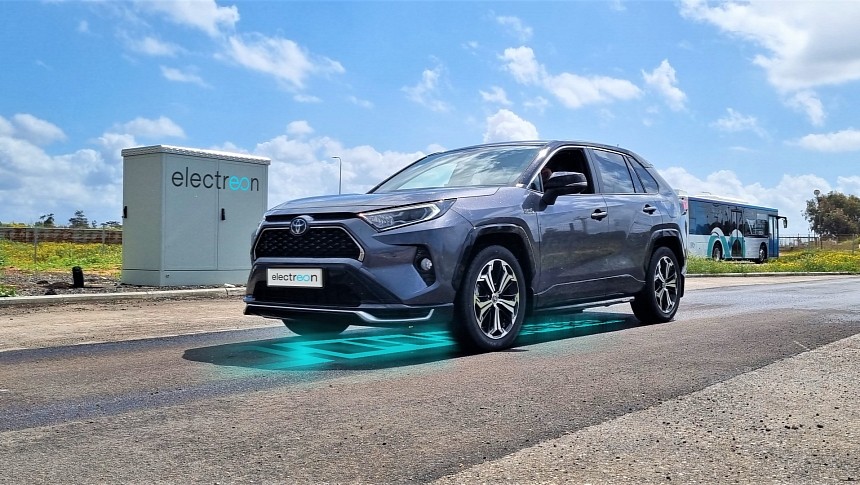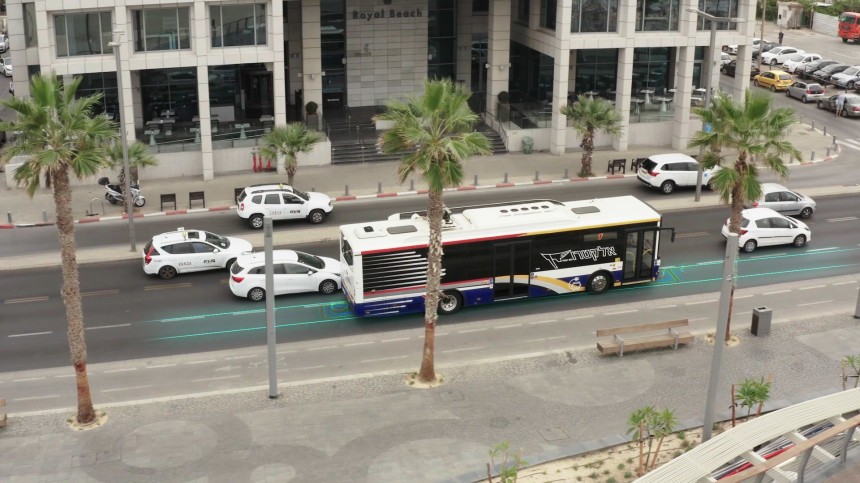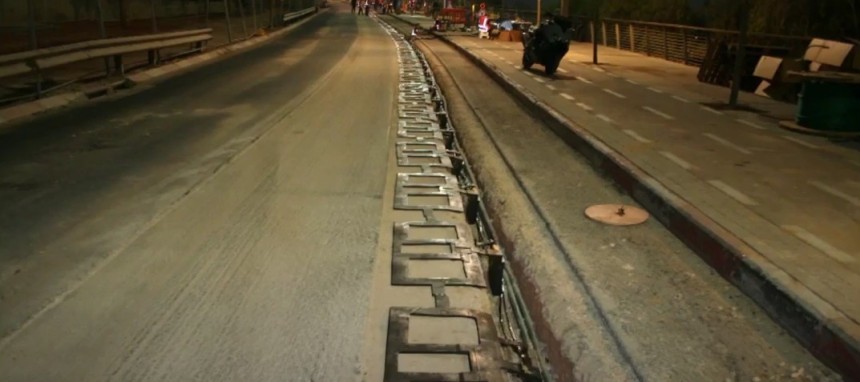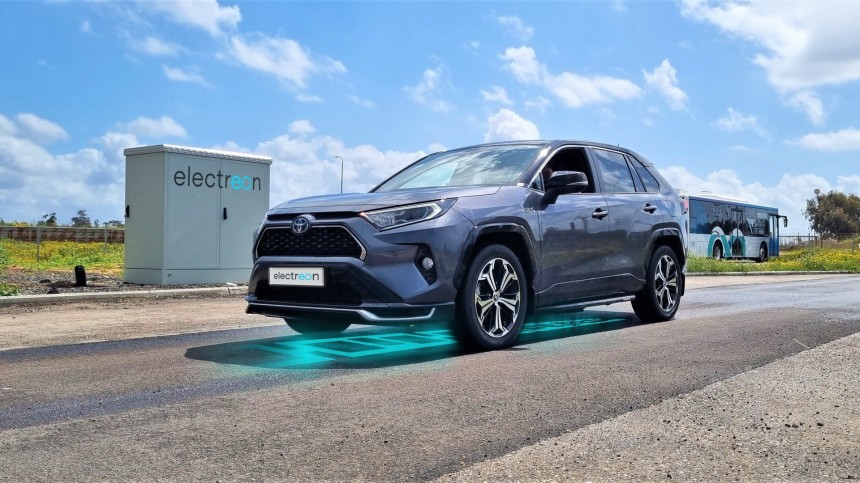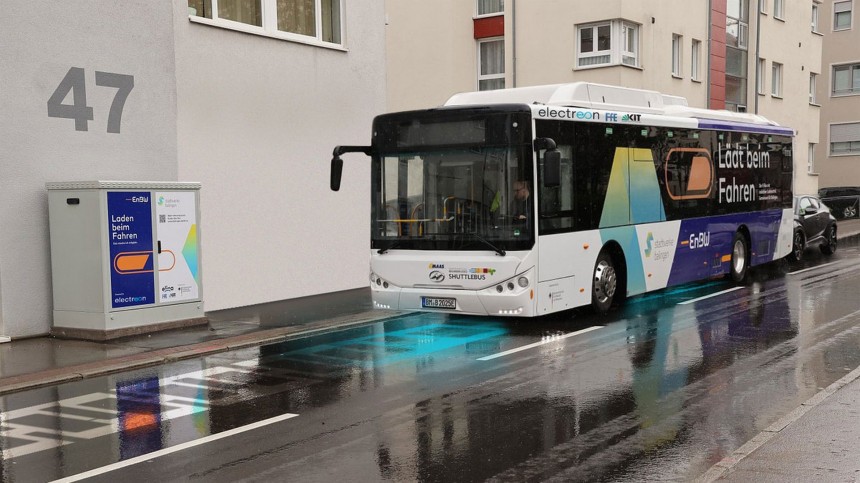Although most BEV advocates are sure battery electric vehicles are the only way out of fossil fuels in personal transportation, others healthily look for other options. One of them is to have electric cars that charge on the go with wireless charging systems. To demonstrate how its technology works, Electreon gave a Toyota RAV4 Prime inductive charging capability and made it run for 100 hours in its tiny test track. With 55 drivers taking turns, the vehicle managed to run 1,206 miles (1,942 kilometers) without stopping for a charge or burning fuel.
That exceeded the Israeli company's early expectations. When Electreon announced its intentions, it expected the car to run 1,500 km (932 mi) in five days. In the end, it achieved a better electric-only range in less time than initially planned: 100 hours are equivalent to four days and four hours. It would be great news, but there's a catch. I'll get there soon.
What seems to make Electreon's system different from other solutions is that its proprietary inductive charging method allows cars to be recharged in movement or parked. In the 219-yard (200-meter) track the company built with its charging coils, only 25% of the route (54.8 yards, or 50 meters) is electrified. While this may not seem like much, it allowed the 18-kWh battery pack on Toyota's plug-in hybrid to remain charged during the 100 hours that the test demanded.
Electreon said it chose a PHEV to prove that electric cars do not need a massive battery pack to offer range anywhere they go. All they need is to be able to charge wirelessly with its technology. It is tempting to say that the idea is fantastic, but not before answering some crucial questions.
A trivial one relates to safety. According to the Israeli company, the coils only activate when a vehicle compatible with the system moves over them. That ensures they "will never transfer energy or radiation to unlicensed vehicles, people or animals passing by." Nice, but how effective is the energy transfer? What are the losses involved with the process? There is no answer to that on the company's website.
The main doubt the system poses is how much it costs to install it on public roads. Supposing it is affordable, there is a legal concern about how a private company can explore the use of a public road to sell its charging services. It will possibly have to pay the government a fee to do so.
One application that could make things easier for the company is focusing on city buses. Instead of using massive battery packs or air rails, they could adopt Electreon's system. As cities usually take care of these buses, they may allow Electreon to put their coils on several streets and avenues where they may also service electric passenger cars. Once the concept is proven and city officials are already used to it, the Israeli company could expand its offer.
To be quite honest, a vehicle with an 18-kWh battery pack, such as the RAV4 Prime already has enough juice for most people's daily driving needs. That said, Electreon's technology would be more useful on highways. Again, offering its services to trucks may allow the Israeli company to also charge passenger vehicles. Without having to carry massive battery packs, both buses and trucks could carry heavier loads. However, another crucial question emerges: at what speed did the RAV4 Prime drive to achieve that range? Unluckily for Electreon, that one is easy to calculate.
If you divide 1,206 miles by 100 hours, you get an average speed of 12.06 mph (19.42 kph). Here's the catch: at such low speeds on a flat track, even the 18 kWh the Toyota's battery pack offers would allow it to break a record. Just check the ridiculous marketing stunt General Motors presented with a Chevrolet Bolt EV in Brazil: the average speed was 21.7 mph (35 kph) for it to reach 560 miles (901.8 km) of range. You'll get a better average in traffic jams. There's no way anyone will drive so slowly.
Perhaps this system is only feasible for city buses, which have a low average speed due to the multiple stops they have to make every day. The Israeli company offers a calculator on its website that presents the cost savings on charging BEV fleets with its technology.
Supposing you had a conventional fleet of 30 electric buses with a daily demand of 600 kWh per vehicle and idle times of 6 hours to charge, you'd save $1,874,700 upfront in infrastructure costs and $$4,870,112 in total initial investments. The page does not explain these calculations or if they include installing the charging infrastructure anywhere, such as in the bus garage.
The truth is that Electreon still has to prove a vehicle such as the RAV4 Prime can achieve a high range at high speeds. Even if that is possible, it also depends on the necessary infrastructure, as fuel cell vehicles do when it comes to hydrogen stations. Are Electreon charging points more or less expensive than such stations? How much does it cost to charge cars with the company's method?
The appeal of using smaller battery packs only works in areas where Electreon chargers are present. If vehicles compatible with that wireless charging system have to travel to places that do not have it, these BEVs will still need to count on their own resources. In that regard, FCEVs have a notable advantage: they carry the energy they will demand to keep moving.
A hybrid system with these two solutions could eventually get rid of big battery packs while ensuring long ranges. It may be the case that a genuinely sustainable carbon-neutral transportation matrix depends on using the best each of these systems has to offer. As long as we can save weight and resources for environmental, efficiency, and safety matters, all solutions are welcome.
What seems to make Electreon's system different from other solutions is that its proprietary inductive charging method allows cars to be recharged in movement or parked. In the 219-yard (200-meter) track the company built with its charging coils, only 25% of the route (54.8 yards, or 50 meters) is electrified. While this may not seem like much, it allowed the 18-kWh battery pack on Toyota's plug-in hybrid to remain charged during the 100 hours that the test demanded.
A trivial one relates to safety. According to the Israeli company, the coils only activate when a vehicle compatible with the system moves over them. That ensures they "will never transfer energy or radiation to unlicensed vehicles, people or animals passing by." Nice, but how effective is the energy transfer? What are the losses involved with the process? There is no answer to that on the company's website.
One application that could make things easier for the company is focusing on city buses. Instead of using massive battery packs or air rails, they could adopt Electreon's system. As cities usually take care of these buses, they may allow Electreon to put their coils on several streets and avenues where they may also service electric passenger cars. Once the concept is proven and city officials are already used to it, the Israeli company could expand its offer.
If you divide 1,206 miles by 100 hours, you get an average speed of 12.06 mph (19.42 kph). Here's the catch: at such low speeds on a flat track, even the 18 kWh the Toyota's battery pack offers would allow it to break a record. Just check the ridiculous marketing stunt General Motors presented with a Chevrolet Bolt EV in Brazil: the average speed was 21.7 mph (35 kph) for it to reach 560 miles (901.8 km) of range. You'll get a better average in traffic jams. There's no way anyone will drive so slowly.
Supposing you had a conventional fleet of 30 electric buses with a daily demand of 600 kWh per vehicle and idle times of 6 hours to charge, you'd save $1,874,700 upfront in infrastructure costs and $$4,870,112 in total initial investments. The page does not explain these calculations or if they include installing the charging infrastructure anywhere, such as in the bus garage.
The truth is that Electreon still has to prove a vehicle such as the RAV4 Prime can achieve a high range at high speeds. Even if that is possible, it also depends on the necessary infrastructure, as fuel cell vehicles do when it comes to hydrogen stations. Are Electreon charging points more or less expensive than such stations? How much does it cost to charge cars with the company's method?
A hybrid system with these two solutions could eventually get rid of big battery packs while ensuring long ranges. It may be the case that a genuinely sustainable carbon-neutral transportation matrix depends on using the best each of these systems has to offer. As long as we can save weight and resources for environmental, efficiency, and safety matters, all solutions are welcome.
We completed our 100-Hour drive!
— Electreon (@Electreon) May 25, 2023
Thank you for watching us break the EV Range Anxiety!!
And thank you to our 55 Drivers!!! pic.twitter.com/fxjfRUD4q0
